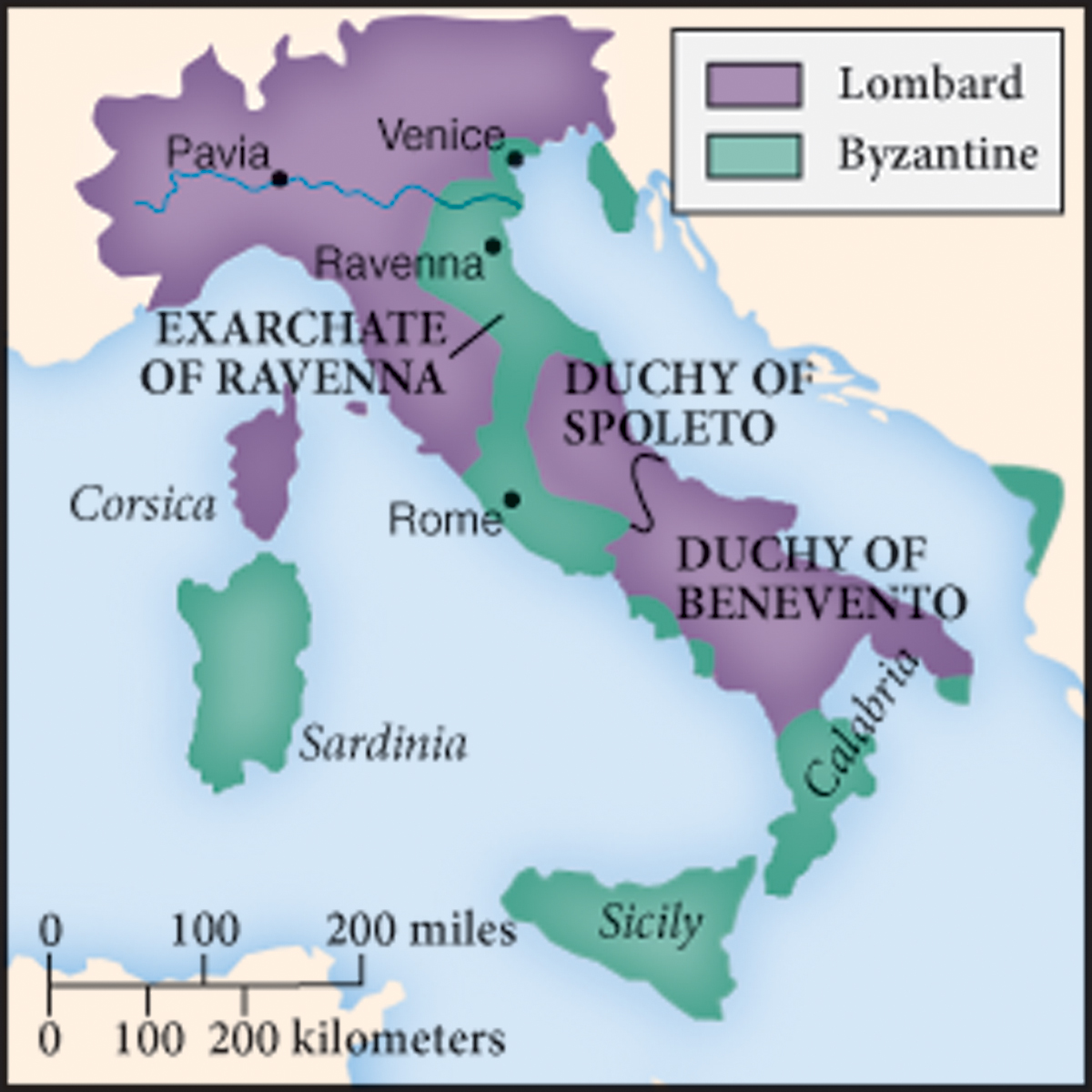Unity in Spain, Division in Italy
Unity in Spain, Division in Italy
Southern Gaul, Spain, and Italy, unlike the British Isles, had long been part of the Roman Empire and preserved many of its traditions. Nevertheless, as these areas were settled and fought over by new peoples, their histories diverged dramatically. When the Merovingian king Clovis (r. 485–511) defeated the Visigoths in 507, the Visigothic kingdom, which had sprawled across southern Gaul into Spain, was dismembered. By midcentury, the Franks had come into possession of most of its remnants in southern Gaul.
In Spain, the Visigothic king Leovigild (r. 569–586) established territorial control by military might. But no ruler could hope to maintain his position in Visigothic Spain without the support of the Hispano-Roman population, which included both the great landowners and leading bishops—and their backing was unattainable while the Visigoths remained Arian Christians, who maintained that Christ was not identical with God (see “The Struggle for Clarification in Christian Belief” in Chapter 7). Leovigild’s son Reccared (r. 586–601) took the necessary step in 587, converting to Roman Catholic Christianity. Two years later, at the Third Council of Toledo, most of the Arian bishops followed their king by announcing their conversion to Catholicism.
Thereafter, the bishops and kings of Spain cooperated to a degree unprecedented in other regions. While the king gave the churchmen free rein to set up their own hierarchy (with the bishop of Toledo at the top) and to meet regularly at synods to regulate and reform the church, the bishops in turn supported their Visigothic king, who ruled as a minister of the Christian people. Rebellion against him was tantamount to rebellion against Christ. The Spanish bishops reinforced this idea by anointing the king, daubing him with holy oil in a ritual that paralleled the ordination of priests and demonstrated divine favor. Toledo, the city where the highest bishop presided, was also where the kings were “made” through anointment. While the bishops in this way made the king’s cause their own, their lay counterparts, the great landowners, helped supply the king with troops, allowing him to maintain internal order and repel his external enemies.
Ironically, it was precisely the centralization and unification of the Visigothic kingdom that proved its undoing. When the Arabs arrived in 711, they needed only to kill the king, defeat his army, and capture Toledo to take the kingdom.

By contrast, in Italy the Lombard king faced a hostile papacy in the center of the peninsula and insubordinate dukes in the south. Theoretically the dukes of Benevento and Spoleto were royal officers, but in fact they ruled independently. Although many Lombards were Catholics, others were Arian. The “official” religion of Lombards in Italy varied with the ruler in power. The conversion of the Lombards to Catholic Christianity occurred gradually, ending only around the mid-seventh century. Partly as a result of this slow development, the Lombard kings never gained the full support of the church.
Nevertheless, Lombard kings had strengths. Chief among these were the traditions of leadership associated with the royal dynasty, the kings’ military ability, their control over large estates in northern Italy, and their hold on surviving Roman institutions. Lombard kings took advantage of the still-urban organization of Italian society and the economy, assigning dukes to city bases and setting up a royal capital at Pavia. Recalling emperors like Constantine and Justinian, the kings built churches, monasteries, and other places of worship in the royal capital; they also maintained the city walls, issued laws, and minted coins. Revenues from tolls, sales taxes, port duties, and court fines filled their treasuries, although their inability to revive the Roman land tax was a major weakness. The greatest challenge for the Lombard kings came from sharing the peninsula with Rome. As soon as the kings began to make serious headway into southern Italy against the duchies of Spoleto and Benevento, the pope began to fear for his own position and called on the Franks for help.